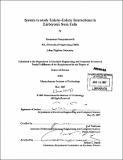System to study colony-colony interactions in embryonic stem cells
Author(s)
Sampattavanich, Somponnat
DownloadFull printable version (47.69Mb)
Other Contributors
Massachusetts Institute of Technology. Dept. of Electrical Engineering and Computer Science.
Advisor
Joel Voldman.
Terms of use
Metadata
Show full item recordAbstract
Many efforts have been made to characterize the necessary regulatory factors involved in self-renewal of embryonic stem cells (ESCs). Recent studies suggested that different autocrine factors exist in murine ESCs (mESCs) and can influence their self-renewal and proliferation, predominantly in deficiency conditions. These observations were investigated based on a comparison of different groups of mESCs that were plated at varying cell densities. In this study, we developed an experimental platform to study colony-colony interactions in mESCs. We have used stencil cell patterning to precisely localize mESC colonies on the culture substrate. This technique allows the formation of mESC colonies with precise shape and controllable inter-colony distances. We monitored colony proliferation, motility and fusion in response to different initial colony configurations over time using the developed image analysis algorithms and immunohistochemistry techniques. Different cultivating conditions commonly used for mESCs were tested to identify the environment where autocrine signaling is significant.
Description
Thesis (S.M.)--Massachusetts Institute of Technology, Dept. of Electrical Engineering and Computer Science, 2007. Includes bibliographical references (p. 101-108).
Date issued
2007Department
Massachusetts Institute of Technology. Department of Electrical Engineering and Computer SciencePublisher
Massachusetts Institute of Technology
Keywords
Electrical Engineering and Computer Science.